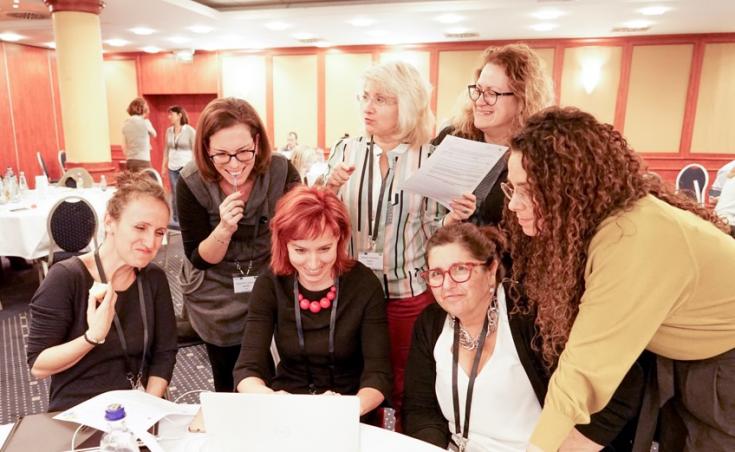Sharing tips for better project implementation

The projects approved in the fourth and the last call of the current Interreg Europe programme are in an exciting phase. They will very soon start working on their first progress reports and take stock of their activities since approval. To help them prepare for this task, we invited representatives of 74 projects to join us in Budapest for three days of seminars on 21-23 January.
Almost all of the projects took us up on our invitation. As a result, we had a venue full of lead partners, finance managers and communication managers buzzing with eagerness to get to work. We had an intensive programme of three full days lined up for them. First up, finance reporting, followed by reporting of activities and results, closing with tips and tricks for project communication.
Who knew project finances could be so much fun?
The seminars kicked off with a day dedicated to finance reporting. With support and guidance from our finance officers, the participants went through the basics of reporting and using the iOLF system. They then dived deeper into details of phase 2 financing, eligibility of expenditure and public procurement.
However, it was not all without some fun and games. The participant put theory into practice in practical exercises and clicked their way through the main reporting steps in iOLF themselves. Finally, it was time to see how much the participants had actually learned during the day in a concluding quiz. Would you know:
- What are the main reasons of irregularities in project reports?
- How should the lump sum be divided among partners?
- Which section of the partner report is not populated into the progress report?
- Which supporting documents have to be provided to receive the preparation costs?
...our participants did - even when they had a timer ticking next to them, counting down the seconds. Well done!
Practice makes perfect, also when it comes to reporting
During the second day, it was time to shift focus to activities and how to report them. Our policy officers took the project representatives through the intricacies of good practice submission, activity reporting, reporting of results, as well as action plan development.
Furthermore, the participants had a chance to wear the shoes of a policy officer and review extracts of actual reports. Not always an easy task! Nevertheless, by working together and helping each other out, the groups figured out what kind of details to keep in mind while compiling their reports.
Next up: the real test. The lead partners face the real-life task of passing the information to all their project partners ahead of submitting their first report to the joint secretariat in just a couple of months.
Policy instruments don't translate into stories - or do they?
After two days of ins and outs of reporting, we closed the seminars with a day dedicated to communication. Together with our communication officers, the participants had a new question to answer: once the reports have been submitted, how to turn the 'reporting language' into communication content with impact?
In two workshops, we went through the basics of working with media and making use of storytelling in project communication. The participants worked on press releases and thought about catchy ways to present their project or the topics their working on - both in words and in images. With some new tools in their toolbox, the participants then spent the afternoon in a series of world café discussions sharing experiences on communication. Take-aways from the day: many new ideas and solutions worth testing!
Our thanks once again to all the participants! We are now very much looking forward to receiving your reports! Good luck!
For a full re-cap of the seminars, have a look at the materials and the seminar website.